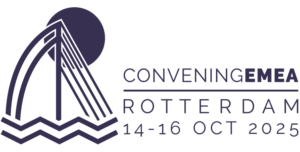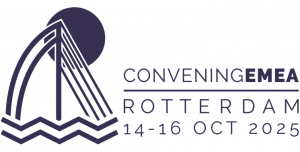
SUSTAINABILITY INITIATIVES AND COMMITMENTS FOR CONVENING EMEA 2025
Production, Materials, Waste
- Phase-out unnecessary handouts and adopt digital-first: Define if and where printing is essential, invest in posters and banners that aren’t time-sensitive so can be re-used or re-purposed and when needed opt for the most sustainable option available.
- Enforce (phase-out) no-polystyrene-use policy
- Enforce (phase-out) zero-single-plastic-use or biodegradable alternatives
- Choose packaging-free products
- Choose recyclable/biodegradable badges and partner with suppliers who support us to make responsible choices
- Choose to rent materials and equipment from the venues and suppliers (not purchase)
- Choose sustainable flooring from a supplier that can produce, supply & recycle
Food and Beverage
- We ask the venues we are using to;
- Reduce packaging of food and plastic use
- Efforts to find effective use of any leftover materials after the event
- We choose/prioritise low-carbon menu sourced locally and organically with season-based ingredients
- We choose/prioritise to implement one day of the event catering as a vegetarian or plant-based menu
- We communicate dietary requirements in advance
- We choose water fountains in all event areas and we consider the local implications of our choices for example we discuss with venues whether we use biodegradable /compostable cups versus glasses which require washing and extra consumption of water in a city experiencing a water shortage.
Venues: energy, waste and water
We ask venues:
- Do venues measure and track environmental performance?
- Yes/No (examples include but not limited to)
- Total energy use
- Total Renewable Energy Use (%)
- Total Waste Generated
- Waste Diversion at Venue
- Can venues provide datasets of the event environmental performance/
- Do venues have sustainability strategies and practices that include (but not limited to):
- Programmes and/or partnerships available directly through the Venue to divert or donate leftover materials/food from the event
- Energy efficiency and reduction programmes
- Furniture available on-site by default (does not need to be purchased or rented separately and brought into the venue)
- Audio/Visual efficient equipment, power down planning
- Digital signage offering
- Accessibility program to the venue and at the venue
Travel to and From Destination
- Include Procurement language (new RFP): accessibility by short flights and trains, offer walkable for attractions, amenities, and experiences during the event or can provide electric vehicle.
- Review amount of site inspections and who needs to attend.
Local Transportation
- Ask if the destination can offer walkable attractions, amenities, and experiences during the event or can provide sustainable transport options
- Provide participants with passes for public transportation (when city and safety allow)
Accommodation
- Investigate, collect, understand and leverage accommodation sustainability documents, initiatives and opportunities, such as energy and water efficiency, zero-waste and zero-plastic, accessibility.
Stakeholders Engagement
- We work with Convening EMEA 2024 venues and suppliers to intentionally consider sustainability in all areas of the event planning.
- Exhibitors are encouraged to consider reducing the environmental impact of events with reduction of unnecessary handouts and engaging with responsible suppliers for necessary materials.
Socially Responsible Partnerships
- Local Community: PCMA Convening EMEA 24 is supporting local impact programmes with the Beach Clean as part of the Exploration Tours
- Support the Future Professionals: PCMA offers the ‘Next Gen Rate’ to Business Event Organisers and Business Event Suppliers who are early in their career.
- Student Volunteers from local Universities; PCMA recruits student volunteers to work with the team onsite at the event.



